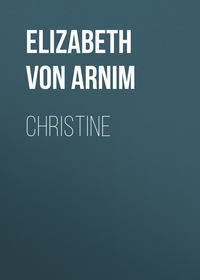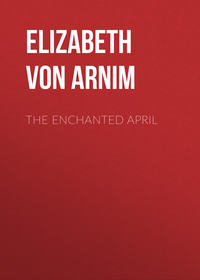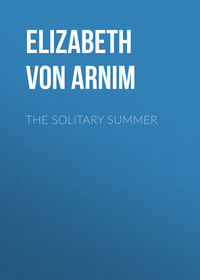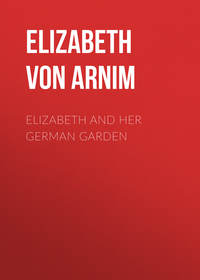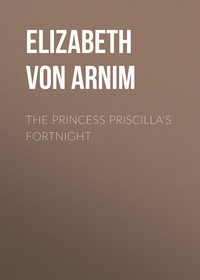 полная версия
полная версияThe Benefactress
"My dear Anna," said Susie; but she was hungry, and ate a roll with perfect complacency, allowing Letty to do the same, although only two days had elapsed since she had so energetically lectured her on the grossness of eating in trains.
Susie was in a particularly amiable frame of mind, and in spite of the weather was looking forward to seeing the place Uncle Joachim had thought would be a fit home for his niece; and as she and Anna were sitting together at one end of the carriage, and Letty and Miss Leech were at the other, and there was no one else in the compartment, she was neither upset by the too near contemplation of her daughter, nor by the aspect of other travellers lunching. Miss Leech, always mindful of her duties, was making the most of her five hours' journey by endeavouring, in a low voice, to clear away the haze that hung in her pupil's mind round the details of her last winter's German studies. "Don't you remember anything of Professor Smith's lectures, Letty?" she inquired. "Why, they were all about just this part of Germany, and it makes it so much more interesting if one knows what happened at the different places. Stralsund, you know, where we shall be presently, has had a most turbulent and interesting past."
"Has it?" said Letty. "Well, I can't help it, Leechy."
"No; but my dear, you should try to recollect something at least of what you heard at the lectures. Have you forgotten the paper you wrote about Wallenstein?"
"I remember I did a paper. Beastly hard it was, too."
"Oh, Letty, don't say beastly—it really isn't a ladylike word."
"Why, mamma's always saying it."
"Oh, well. Don't you know what Wallenstein said when he was besieging Stralsund and found it such a difficult task?"
"I suppose he said too that it was beastly hard."
"Oh, Letty—it was something about chains. Now do you remember?"
"Chains?" repeated Letty, looking bored. "Do you know, Leechy?"
"Yes, I still remember that, though I confess that I have forgotten the greater part of what I heard."
"Then what do you ask me for, when you know I don't know? What did he say about chains?"
"He said that he'd take the city, if it were rivetted to heaven with chains of iron," said Miss Leech dramatically.
"What a goat."
"Oh, hush—don't say those horrible words. Where do you learn them? Not from me, certainly not from me," said Miss Leech, distressed. She had a profound horror of slang, and was bewildered by the way in which these weeds of rhetoric sprang up on all occasions in Letty's speech.
"Well, and was it?"
"Was it what, my dear?"
"Chained to heaven?"
"The city? Why, how can a city be chained to heaven, Letty?"
"Then what did he say it for?"
"He was using a metaphor."
"Oh," said Letty, who did not know what a metaphor was, but supposed it must be something used in sieges, and preferred not to inquire too closely.
"He was obliged to retire," said Miss Leech, "leaving enormous numbers of slain on the field."
"Poor beasts. I say, Leechy," she whispered, "don't let's bother about history now. Go on with Mr. Jessup. You'd got to where he called you Amy for the first time."
Mr. Jessup was the person already alluded to in these pages as the only man Miss Leech had ever loved, and his history was of absorbing interest to Letty, who never tired of hearing his first appearance on Miss Leech's horizon described, with his subsequent advances before the stage of open courting was reached, the courting itself, and its melancholy end; for Mr. Jessup, a clergyman of the Church of England, with a vicarage all ready to receive his wife, had suddenly become a prey to new convictions, and had gone over to the Church of Rome; whereupon Miss Leech's father, also a clergyman of the Church of England, had talked a great deal about the Scarlet Woman of Babylon, and had shut the door in Mr. Jessup's face when next he called to explain. This had happened when Miss Leech was twenty. Now, at thirty, an orphan resigned to the world's buffets, she found a gentle consolation in repeating the story of her ill-starred engagement to her keenly interested friend and pupil; and the oftener she repeated it the less did it grieve her, till at last she came actually to enjoy the remembrance of it, pleased to have played the principal part even in a drama that was hissed off her little stage, glad to find a sympathetic listener, dwelling much and fondly on every incident of that short period of importance and glory.
It is doubtful whether she would ever have extracted the same amount of pleasure from Mr. Jessup had he remained fixed in the faith of his fathers and married her in due season. By his secession he had unconsciously become a sort of providence to Letty and herself, saving them from endless hours of dulness, furnishing their lonely schoolroom life with romance and mystery; and if in Miss Leech's mind he gradually took on the sweet intangibility of a pleasant dream, he was the very pith and marrow of Letty's existence. She glowed and thrilled at the thought that perhaps she too would one day have a Mr. Jessup of her own, who would have convictions, and give up everything, herself included, for what he believed to be right.
As usual, they at once became absorbed in Mr. Jessup, forgetting in the contemplation of his excellencies everything else in the world, till they were roused to realities by their arrival at Stralsund; and Susie, thrusting books and bags and umbrellas into their passive hands, pushed them out of the carriage into the wet.
Hilton, the maid shared by Susie and Anna, had then to be found and urged to clamber down quickly on to the low platform, where she stood helplessly, the picture of injured superiority, hustled by the hurrying porters and passengers, out of whose way she scorned to move, while Anna went to look for the luggage and have it put into the cart that had been sent for it.
This cart was an ordinary farm cart, used for bringing in the hay in June, but also used for carrying out the manure in November; and on a sack of straw lying in the bottom it was expected that Hilton should sit. The farm boy who drove it, and who helped the porter to tie the trunks to its sides lest they should too violently bump against each other and Hilton on the way, said so; the coachman of the carriage waiting for the Herrschaften pointed with his whip first at Hilton and then at the cart, and said so; the porter, who seemed to think it quite natural, said so; and everybody was waiting for Hilton to get in, who, when she had at length grasped the situation, went to Susie, who was looking frightened and pretending to be absorbed by the sky, and with a voice shaken by passion, and a face changing from white to red, announced her intention of only going in that cart as a corpse, when they might do with her as they pleased, but as a living body with breath in it, never.
Here was a difficulty. And idlers, whose curiosity was not extinguishable by wind and sleet, began to press round, and people who had come by the same train stopped on their way out to listen. The farm boy patted the sack and declared that it was clean straw, the coachman stood up on his box and swore that it was a new sack, the porter assured the Fräulein that it was as comfortable as a feather bed, and nobody seemed to understand that what she was being offered was an insult.
Susie was afraid of Hilton, who had been in the service of duchesses, and who held these duchesses over her mistress's head whenever her mistress wanted to do anything that was inconvenient to herself; quoting their sayings, pointing out how they would have acted in any given case, and always, it appeared, they had done exactly what Hilton desired. Susie's admiration for duchesses was slavish, and Hilton was treated with an indulgent liberality that was absurd compared to the stinginess displayed towards everyone else. Hilton was not more horrified than her mistress when she saw the farm cart, and understood that it was for the luggage and the maid. It was impossible to take her with them in what the porter called the herrschaftliche Wagen, for it was a kind of victoria, and how to get their four selves into it was a sufficient puzzle. "What shall we do?" said Susie, in despair, to Anna.
"Do? Why, she'll have to go in it. Hilton, don't be a foolish person, and don't keep us here in the wet. This isn't England, and nobody thinks anything here of driving in farm carts. It is patriarchal simplicity, that's all. People are staring at you now because you are making such a fuss. Get in like a good soul, and let us start."
"Only as a corpse, m'm," reiterated Hilton with chattering teeth, "never as a living body."
"Nonsense," said Anna impatiently.
"What shall we do?" repeated Susie. "Poor Hilton—what barbarians they must be here."
"We must send her in a Droschky, then, if it isn't too far, and we can get one to go."
"A Droschky all that distance! It will be ruinous."
"Well, we can't stand here amusing these people for ever."
"Oh, I wish we had never come to this horrible place!" cried Susie, really made miserable by Hilton's rage.
But Anna did not stay to listen either to her laments or to Hilton's monotonous "Only as a corpse, m'lady," and was already arranging with an unwilling driver, who had no desire whatever to drive to Kleinwalde, but consented to do so on being promised twenty marks, a rest and feed of oats for his horses, and any little addition in the shape of refreshment and extra money that might suggest itself to Anna's generosity.
"You know, Anna, you can't expect me to pay for the fly," said Susie uneasily, when the appeased Hilton had been put into it and was out of earshot. "That dreadful cart is your property, I suppose."
"Of course it is," said Anna, smiling, "and of course the fly is my affair. How magnificent I feel, disposing of carts and Droschkies. Now, will you please to get into my carriage? And do you observe the extreme respectfulness of my coachman?"
The coachman, a strange-looking, round-shouldered being, with a long grizzled beard, a dark-blue cloth cap on his head, and a body clothed in a fawn-coloured suit and gaiters, on which a great many tarnished silver buttons adorned with Uncle Joachim's coat of arms were fastened at short intervals, removed his cap while his new mistress and her party were entering the carriage, and did not put it on again till they were ready to start.
"Quite as though we were royalties," said Susie.
"But the rest of him isn't," replied Anna, who was greatly amused by the turn-out. "Do you like my horses, Susie? Or do you suspect them of having been ploughing all the morning? Oh, well," she added quickly, ashamed of laughing at any part of her dear uncle's gift, "I suppose one has to have heavily built horses in this part of the world, where the roads are probably frightfully bad."
"Their tails might be a little shorter," said Susie.
"They might," agreed Anna serenely.
With the aid of the porter, who knew all about Uncle Joachim's will and was deeply interested, they were at last somehow packed into the carriage, and away they rattled over the rough stones, threading the outskirts of the town on the mainland, the hail and wind in their faces, out into the open country, with their horses' heads turned towards the north. The fly containing Hilton followed more leisurely behind, and the farm cart containing the unused sack of straw followed the fly.
"We can't see much of Stralsund," said Anna, trying to peep round the hood at the old town across the lakes separating it from the mainland.
"It's a very historical town," observed Susie, who had happened to notice, as she idly turned over the pages of her Baedeker on the way down, that there was a long description of it with dates. "As of course you know," she added, turning sharply to her daughter.
"Rather," said Letty. "Wallenstein said he'd take it if it were chained to heaven, and when he found it wasn't he was frightfully sick, and went away and left them all in the fields."
Miss Leech, who was on the little seat, struggling to defend herself from the fury of the elements with an umbrella, looked anxious, but Susie only said in a gratified voice, "I'm glad you remember what you've been taught." To which Letty, who was in great spirits, and thought this drive in the wet huge fun, again replied heartily, "Rather," and her mother congratulated herself on having done the right thing in bringing her to Germany, home of erudition and profundity, already evidently beginning to do its work.
The carriage smelt of fish, which presently upset Susie, who, unfortunately for her, had a nose that smelt everything. While they were in the town she thought the smell was in the streets, and bore it; but out in the open, where there was not a house to be seen, she found that it was in the carriage.
She fidgeted, and looked about, feeling with her foot under the opposite seat, expecting to find a basket somewhere, and determined if she found one to push it out quietly and say nothing; for that she should drive for two hours with her handkerchief up to her nose was more than anybody could expect of her. Already she had done more than anybody ought to expect of her, she reflected, in going to the expense of the journey and the inconvenience of the absence from home for Anna's sake, and she hoped that Anna felt grateful. She had never yet shrunk from her duty towards Anna, or indeed from her duty towards anyone, and she was sure she never would; but her duty certainly did not include the passive endurance of offensive smells.
"What are you looking for?" asked Anna.
"Why, the fish."
"Oh, do you smell it too?"
"Smell it? I should think I did. It's killing me."
"Oh, poor Susie!" laughed Anna, who was possessed by an uncontrollable desire to laugh at everything. The conveyance (it could hardly be called a carriage) in which they were seated, and which she supposed was the one destined for her use if she lived at Kleinwalde, was unlike anything she had yet seen. It was very old, with enormous wheels, and bumped dreadfully, and the seat was so constructed that she was continually slipping forward and having to push herself back again. It was lined throughout, including the hood, with a white and black shepherd's plaid in large squares, the white squares mellowed by the stains of use and time to varying shades of brown and yellow; when Miss Leech's umbrella was blown aside by a gust of wind Anna could see her coachman's drab coat, with a little end of white tape that he had forgotten to tie, and whose uses she was unable to guess, fluttering gaily between its tails in the wind; on the left side of the box was a very big and gorgeous coat of arms in green and white, Uncle Joachim's colours; and whichever way she turned her head, there was the overpowering smell of fish. "We must be taking our dinner home with us," she said, "but I don't see it anywhere."
"There isn't anything under the seats. Perhaps the man has got it on the box. Ask him, Anna; I really can't stand it."
Anna did not quite know how to attract his attention. It seemed undignified to poke him, but she did not know his name, and the wind blew her voice back in the direction of Stralsund when she had cleared it, and coughed, and called out rather shyly, "Oh, Kutscher! Kutscher!"
Then she remembered that oh was not German, and that Uncle Joachim had used sonorous achs in its place, and she began again, "Ach, Kutscher! Kutscher!"
Letty giggled. "Go it, Aunt Anna," she said encouragingly, "dig him in the ribs with your umbrella—or I will, if you like."
Her mother, with her handkerchief to her nose, exhorted her not to be vulgar. Letty explained at some length that she was only being nice, and offering assistance.
"I really shall have to poke him," said Anna, her faint cries of Kutscher quite lost in the rattling of the carriage and the howling of the wind. "Or perhaps you would touch his arm, Miss Leech."
Miss Leech turned, and very gingerly touched his sleeve. He at once whistled to his horses, who stopped dead, snatched off his cap, and looking down at Anna inquired her commands.
It was done so quickly that Anna, whose conversational German was exceedingly rusty, was quite unable to remember the word for fish, and sat looking up at him helplessly, while she vainly searched her brains.
"What is fish in German?" she said, appealing to Susie, distressed that the man should be waiting capless in the rain.
"Letty, what's the word for fish?" inquired Susie sternly.
"Fish?" repeated Letty, looking stupid.
"Fish?" echoed Miss Leech, trying to help.
"Fisch?" said the coachman himself, catching at the word.
"Oh, yes; how utterly silly I am," cried Anna blushing and showing her dimples, "it's Fisch, of course. Kutscher, wo ist Fisch?"
The man looked blank; then his face brightened, and pointing with his whip to the rolling sea on their right, visible across the flat intervening fields, he said that there was much fish in it, especially herrings.
"What does he say?" asked Susie from behind her handkerchief.
"He says there are herrings in the sea."
"Is the man a fool?"
Letty laughed uproariously. The coachman, seeing Letty and Anna laugh, thought he must have said the right thing after all, and looked very pleasant.
"Aber im Wagen," persisted Anna, "wo ist Fisch im Wagen?"
The coachman stared. Then he said vaguely, in a soothing voice, not in the least knowing what she meant, "Nein, nein, gnädiges Fräulein," and evidently hoped she would be satisfied.
"Aber es riecht, es riecht!" cried Anna, not satisfied at all, and lifting up her nose in unmistakeable displeasure.
His face brightened again. "Ach so—jawohl, jawohl," he exclaimed cheerfully; and hastened to explain that there were no fish nearer than the sea, but that the grease he had used that morning to make the leather of the hood and apron shine certainly had a fishy smell, as he himself had noticed. "The gracious Miss loves not the smell?" he inquired anxiously; for he had seven children, and was very desirous that his new mistress should be pleased.
Anna laughed and shook her head, and though she said with great emphasis that she did not love it at all, she looked so friendly that he felt reassured.
"What does he say?" asked Susie.
"Why, I'm afraid we shall have it all the way. It's the grease he's been rubbing the leather with."
"Barbarian!" cried Susie angrily, feeling sick already, and certain that she would be quite ill by the end of the drive. "And you laugh at him and encourage him, instead of taking up your position at once and showing him that you won't stand any nonsense. He ought to be—to be unboxed!" she added in great wrath; for she had heard of delinquent clergymen being unfrocked, and why should not delinquent coachmen be unboxed?
Anna laughed again. She tried not to, but she could not help it; and Susie, made still more angry by this childish behaviour, sulked during the rest of the drive.
"Go on—avanti!" said Anna, who knew hardly any Italian, and when she was in Italy and wanted her words never could find them, but had been troubled the last two days by the way in which these words came to her lips every time she opened them to speak German.
The coachman understood her, however, and they went on again along the straight high-road, that stretched away before them to a distant bend. The high-road, or chaussée, was planted on either side with maples, and between the maples big whitewashed stones had been set to mark the way at night, and behind the rows of trees and stones, ditches had been dug parallel with the road as a protection to the crops in summer from the possible wanderings of erring carts. If a cart erred, it tumbled into the ditch. The arrangement was simple and efficacious. On the right, across some marshy land, they could see the sea for a little while, with the flat coast of Rügen opposite; and then some rising ground, bare of trees and brilliantly green with winter corn, hid it from view. On the left was the dreary plain, dotted at long intervals with farms and their little groups of trees, and here and there with windmills working furiously in the gale. The wind was icy, and the December snow still lay in drifts in the ditches. In that leaden landscape, made up of grey and brown and black, the patches of winter rye were quite startling in their greenness.
Susie thought it the most God-forsaken country she had ever seen, and expressed this opinion plainly on her face and in her attitudes without any need for opening her lips, shuddering back ostentatiously into her corner, wrapping herself with elaborate care in her furs, and behaving as slaves to duty sometimes do when the paths they have to tread are rough.
After driving along the chaussée for about an hour, they passed a big house standing among trees back from the road on the right, and a little farther on came to a small village. The carriage, pulled up with a jerk, and looking eagerly round the hood Anna found they had come to a standstill in front of a new red-brick building, whose steps were crowded with children. Two or three men and some women were with the children. Two of the men appeared to be clergymen, and the elder, a middle-aged, mild-faced man, came down the steps, and bowing profoundly proceeded to welcome Anna solemnly, on behalf of those children from Kleinwalde who attended this school, to her new home. He concluded that Anna was the person to be welcomed because he could see nothing of the lady in the other corner but her eyes, and they looked anything but friendly; whereas the young lady on the left was leaning forward and smiling and holding out her hand.
He took it, and shook it slowly up and down, while he begged her to allow the hood of the carriage to be put back, so that the children from her village, who had walked three miles to welcome her, might be able to see her; and on Anna's readily agreeing to this, himself helped the coachman with his own white-gloved hands to put it down. Susie was therefore exposed to the full fury of the blast, and shrank still farther into her corner—an interesting and tantalising object to the school-children, a dark, mysterious combination of fur, cocks' feathers, and black eyebrows.
Then the clergyman, hat in hand, made a speech. He spoke distinctly, as one accustomed to speaking often and long, and Anna understood every word. She was wholly taken aback by these ceremonies, and had no idea of what she should say in reply, but sat smiling vaguely at him, looking very pretty and very shy. She soon found that her smiles were inappropriate, and they died away; for, warming as he proceeded, the parson, it appeared, was taking it for granted that she intended to live on her property, and was eloquently descanting on the comfort she was going to be to the poor, assuring those present that she would be a mother to the sick, nursing them with her tender woman's hands, an angel of mercy to the hungry, feeding them in the hour of their distress, a friend and sister to the little children, succouring them, caring for them, pitiful of their weakness and their sins. His face lit up with enthusiasm as he went on, and Anna was thankful that Susie could not understand. This crowd of children, the women, the young parson, her coachman, were all hearing promises made on her behalf that she had no thought of fulfilling. She looked down, and twisted her fingers about nervously, and felt uncomfortable.
At the end of his speech, the parson, his eyes full of the tears drawn forth by his own eloquence, held up his hand and solemnly blessed her, rounding off his blessing with a loud Amen, after which there was an awkward pause. Susie heard the Amen, and guessed that something in the nature of a blessing was being invoked, and made a movement of impatience. The parson was odious in her eyes, first because he looked like the ministers of the Baptist chapels of her unmarried youth, but principally because he was keeping her there in the gale and prolonging the tortures she was enduring from the smell of fish. Anna did not know what to say after the Amen, and looked up more shyly than ever, and stammered in her confusion Danke sehr, hoping that it was a proper remark to make; whereupon the parson bowed again, as one who should say Pray don't mention it. Then another man, evidently the schoolmaster, took out a tuning-fork, gave out a note, and the children sang a chorale, following it up with other more cheerful songs, in which the words Frühling and Willkommen were repeated a great many times, while the wind howled flattest contradiction.


